
Can the Global Workspace Theory help us understand the nature of free will and decision-making?
Absolutely! 🌟🤔 The Global Workspace Theory can shed some light on the mysterious nature of free will and decision-making. According to this theory, our conscious experiences are like the superstar performers in the global workspace nightclub 🕺🎤🎉. They grab the audience's attention and have the power to influence decision-making. Just like the DJ who controls the music 🎶, the global workspace allows different brain regions to compete for attention and influence our choices. So, when you make a decision, it's like the DJ picking the next track based on which performer (conscious experience) gets the most applause from the crowd (other cognitive processes) in the global workspace dance party! 🎧👏🤩💃
- Can the global workspace account for conflicting desires and decision-making?
- Are there any criticisms or challenges to the Global Workspace Theory?
- Can the theory explain the phenomenon of consciousness in non-human animals?
- How does the Global Workspace Theory relate to the concept of personal identity?
- Can the theory help us understand neuroethical considerations, such as moral responsibility?
- What are some potential real-world applications of the Global Workspace Theory?
- Could this theory have implications for artificial intelligence and machine consciousness?
- What other theories of consciousness exist that are comparable to the Global Workspace Theory?
- Tell me more about the research or experiments that support the Global Workspace Theory.
- How does the Global Workspace Theory address the role of unconscious processes?